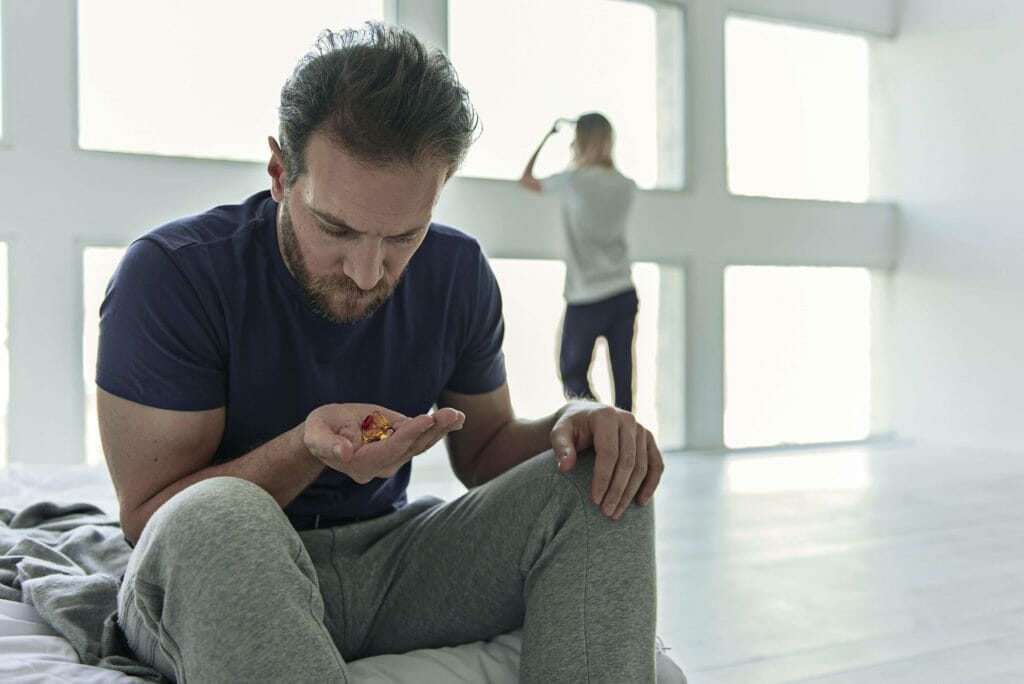Helping a Spouse with Drug Addiction

Drug addiction can turn the person you love the most into someone unrecognizable. If your spouse struggles with drug addiction, you probably experience a wide range of emotions – anger, fear, resentment, hopelessness, and more. You have likely endured hurtful words and actions from the person you should be able to trust the most.
Addiction is a family disease because it damages every person in the family unit. Besides the emotional pain and stress it causes family members, it may also cause financial, legal, and other serious problems.
But with professional help, recovery is possible, and the family unit can heal. Research has found that ongoing family support plays a vital role in a family member’s recovery. In fact, it is often a family member who gets the addicted loved one into recovery.
Why Can’t My Spouse Simply Stop Using Drugs?
It is normal to feel anger and frustration with your addicted loved one, believing they should love you enough to stop the addiction that is destroying your relationship. If you understand the disease of addiction and how it affects the brain, you will appreciate how hard it is for an addicted person to stop using drugs on their own.
The American Society of Addiction Medicine defines addiction as, “a treatable, chronic medical disease involving complex interactions among brain circuits, genetics, the environment, and an individual’s life experiences. People with addiction use substances or engage in behaviors that become compulsive and often continue despite harmful consequences.”
The key takeaways are that addiction is a chronic medical disease that affects the way the brain works and that it is treatable. Addiction affects brain circuitry in such a way that the addicted person may not be capable of feeling pleasure without the addictive substance. That makes it incredibly difficult to stop using drugs without professional help.
How To Help a Spouse Overcome Addiction
Education
If a doctor diagnosed your spouse with cancer, diabetes, heart disease, or another chronic condition, you would want to learn about the disease and the ways you could help. It should be the same with the chronic disease of addiction. The more you learn about addiction, the more you will get over your anger and disappointment and be ready to help your spouse recover.
Researchers believe people use drugs and alcohol to escape physical and emotional pain. Using an addictive substance triggers the pleasure and reward system of the brain to increase levels of “feel good” chemicals like dopamine and serotonin.
As drug use continues, the brain actually rewires itself, so it comes to rely on the influx of the addictive substance to deliver the pleasure response. Eventually, the addicted person may be unable to feel good, or even “normal” without the use of the drug. It is a human need to feel pleasure, and if your spouse can only fulfill that need with drugs, they need professional help to break the hold of addiction.
Stage an intervention
You have talked, threatened, cried, and more, and still, your spouse resists treatment and continues to use drugs. What now? It may be time to stage an intervention. While you can plan the intervention on your own, it is helpful to seek guidance from an addiction specialist or a professional interventionist.
You should carefully plan an intervention before the actual meeting and include only those your spouse trusts and who can remain nonjudgmental. You, and other friends or family who are attending, should write out specific examples of how your spouse’s addictive behavior has hurt them. Discuss what each person will say, and what to do if your spouse refuses treatment.
Be ready with information about local or online NA support group meeting schedules, and details about the inpatient or outpatient treatment program you have researched and selected as the best treatment program for your spouse.
Throughout the intervention, it is important to reassure your spouse that you believe they can recover and that you will support them throughout the process.
Other Ways To Help Your Addicted Spouse
If they refuse treatment:
Don’t give up hope. Your words may have a bigger impact than you realize and might be the reason they eventually seek treatment. Meanwhile, set boundaries and stick to them. Make your spouse responsible for their behavior. Refuse to cover for them by bailing them out or making excuses for missing work. Reinforce that their actions have consequences.
During and after treatment
- Attend family counseling. Communicate regularly with the treatment team about progress or concerns.
- Commit to a drug and alcohol-free, and calm home environment.
- Understand which people, places, or situations have triggered past addictive behavior and help your spouse avoid or better manage these triggers.
- Encourage your spouse to develop new relationships and activities with sober people. Explore drug-free activities you can do together.
- Encourage your spouse to remain in individual or group counseling, and to attend a support group regularly.
Take care of yourself
Whether or not your spouse has agreed to enter treatment, it is important that you take of yourself. By living a healthy lifestyle, including good nutrition, regular exercise, and practicing techniques like meditation, yoga, mindfulness, and other ways to manage stress, you are providing a healthy environment for you and your family. The happier and more centered you are, the better equipped you are to help your addicted spouse.
At Midwest Recovery Centers, our compassionate staff specializes in treating prescription or illegal drug dependence, alcohol dependence, co-occurring disorders, and other addictive behaviors, while providing education, counseling, and support for families. Contact Midwest Recovery Centers today to start your recovery.
Reviewed and Assessed by
Taylor Brown, B.A.Com., MAADC II
Tim Coleman, M. of Ed.




